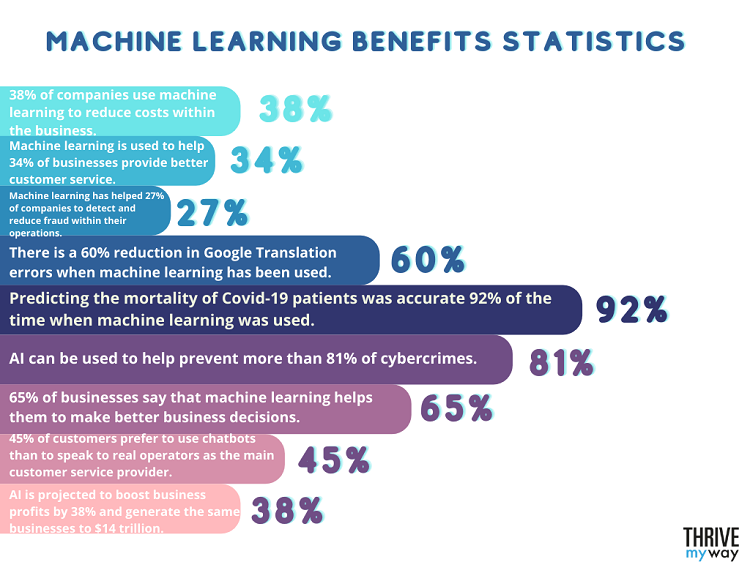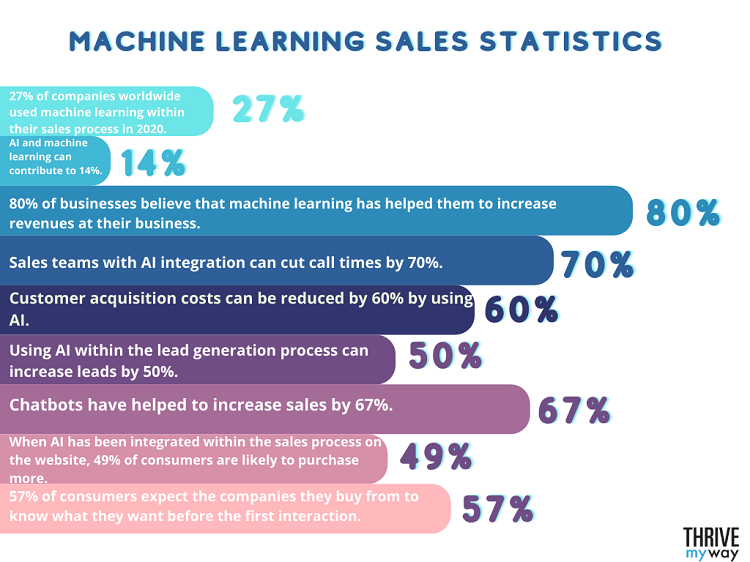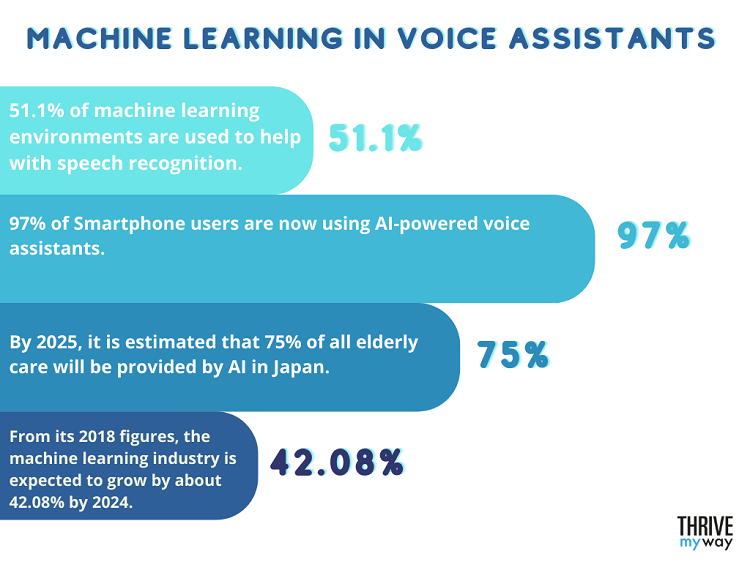Data is one of the most valuable assets that business owners can have. Machine learning can turn data into valuable assets that can help with business decisions.
Here are some machine learning stats for you.
Table of Contents
ToggleInteresting Machine Learning Stats, Trends, and Facts for 2024
- Less than 10% of businesses use machine learning within their customer service departments.
- Most experts believe that machine learning will be more mature by the end of 2021 compared to 2020.
- Only when evaluating user cases has there been a decline in the maturity of machine learning.
- 50% of Russian insurance companies use machine learning to help with cloud technology.
- 62% of Russian insurance companies use machine learning at some point in their online chat environments.
- 91.5% of businesses are currently investing in some form of AI.
- 41% of consumers believe that AI can help them have better shopping experiences.
Machine Learning Market Size, Share, Growth, and Trends
- In 2019, 71% of companies expected to increase their spending on machine learning.
- Only 2% of all companies are expected to spend less on machine learning in 2019.
- The chip market revenue in 2021 is estimated to be worth $4.38 billion.
- By 2027, the chip market revenue is expected to be worth an estimated $21.31 billion.
- Research and development utilize machine learning and data science the most with 71% adoption.
- Funding for machine learning applications was $28.5 billion in 2019.
- Funding for machine learning platforms was $14.4 billion in 2019.
- During the first six months of 2021, $29 billion was invested in machine learning across the world.
- Machine learning budgets increased by 25% in 2021 from 2020.
Machine Learning Adoption Statistics
- 73% of companies are using machine learning to help them fight cyber criminals from attacking their businesses.
- 25% of companies do not use machine learning as a form of protection against cybercrime.
- The biggest reason why machine learning was adopted in 2018 was to offer better analytics.
- Security was the second top reason why machine learning was adopted within businesses.
- 39% of Smartphone users had actively used predictive text on their phones in Australia in 2017.
- In 2017, 20% of Australian Smartphone owners used route suggestions.
- Currently, 57% of businesses are actively seeking to add machine learning to their business or improve on existing technology they already have.
- 80% of businesses in the US have adopted some form of AI.
- 37% of businesses in Asia have adopted some form of machine learning.
- Only 29% of businesses in Europe have adopted some form of machine learning in their normal operations.
- 44% of larger businesses estimate that without investment in AI, they will lose out to smaller startup businesses.
- 51% of consumers will use a voice-activated app in the car.
- 8 billion will use voice assistants by 2024.
- The top challenges for machine learning adoption include scaling (43%), the vision of the future models (41%), and achieving alignment across the organization (34%).
- 44% of businesses have deployed some form of AI and machine learning within their organization.
- 44% of customers don’t realize that they’ve already used a platform that incorporates AI technology.
Machine Learning Benefits Statistics

- 38% of companies use machine learning to reduce costs within the business.
- Machine learning is used to help 34% of businesses provide better customer service.
- Machine learning has helped 27% of companies to detect and reduce fraud within their operations.
- Netflix estimated that they saved more than $1 billion with machine learning.
- There is a 60% reduction in Google Translation errors when machine learning has been used.
- Predicting the mortality of Covid-19 patients was accurate 92% of the time when machine learning was used.
- AI can be used to help prevent more than 81% of cybercrimes.
- 65% of businesses say that machine learning helps them to make better business decisions.
- 45% of customers prefer to use chatbots than to speak to real operators as the main customer service provider.
- By 2035, AI is projected to boost business profits by 38% and generate the same businesses an additional $14 trillion.
Machine Learning in Business Statistics

- 62% of business leaders believe that machine learning will impact how businesses are run by 2024.
- 55% of all AI and machine learning was hosted on a private cloud in 2019.
- NTT owned the most patents for machine learning in 2020 with more than 1928 patents owned.
- In 2011, Microsoft owned the most patents for Machine learning in the world.
- In November 2020, IBM had the most machine learning patents, with more than 5500 held. Microsoft had 5400.
- 31% of retailers in 2018 used in-house machine learning within their business operations.
- In 2018, 34% of businesses stated they were completely reliant on machine learning and the insights it gave.
- AI has helped businesses to improve productivity by 45% on average.
- 82% of risk management processes now use some form of AI or machine learning.
- 74% of all analyses and reporting will use AI and machine learning.
- Azure Machine Learning framework is 62% accurate when it is used to predict the stock market’s highs and lows.
- Only 40% of businesses check that their machine-learning model is fair and free from bias. This figure is higher (54%) when the business has had extensive experience working with machine learning models in the past.
- Only one in two businesses check that their machine learning models comply with privacy laws.
- The top challenges for businesses with machine learning include poor data quality (43%), lack of data (38%), and finding qualified data scientists (33%).
- It is estimated that 85% of interactions with customers are done without any human involvement.
- In companies that have already deployed AI throughout the business, 30% have achieved substantial economic benefits, and 53% have achieved moderate economic benefits.
- Nearly three-quarters (72%) of executives believe that AI can help their employees to do more meaningful work.
- Business executives are utilizing machine learning to help reduce the need for menial tasks that don’t add much value to the business. Some tasks that are being reduced include paperwork (82%), scheduling (79%), and timesheets (78%).
- AI personal assistance (31%) and data analysis (29%) are where executives think the biggest difference will be made by machine learning.
Machine Learning Sales Statistics

- 27% of companies worldwide used machine learning within their sales process in 2020.
- It is expected that AI and machine learning can contribute to 14% of GDP.
- 80% of businesses believe that machine learning has helped them to increase revenues at their business.
- Sales teams with AI integration can cut call times by 70%.
- Customer acquisition costs can be reduced by 60% by using AI.
- Using AI within the lead generation process can increase leads by 50%.
- Chatbots have helped to increase sales by 67%.
- When AI has been integrated into the sales process on the website, 49% of consumers are likely to purchase more often and 34% are more likely to spend more.
- 57% of consumers expect the companies they buy from to know what they want before the first interaction.
Machine Learning and Marketing Statistics
- 43% of millennials are willing to pay more for better customer service that combines machine learning and human interaction.
- 56.5% of content publishers are using AI and machine learning to add more personalization to content for better results.
- Machine learning has helped Amazon to reduce ‘click to ship’ time (the time for the customer to land on a website and make a purchase) from 75 minutes to 15 minutes.
- 87% of marketers are using AI and machine learning to help them improve the performance of their email marketing.
- Marketing leaders are twice as likely to report that they’re going to invest in machine learning.
- Amazon Go stores are powered by AI, and there are to be 3000 stores in the US by the end of 2021.
- There are 10 million products that can be shipped within one-day on Amazon thanks to AI implementation at their fulfillment centers.
- Marketing professionals waste approximately five and a half hours trying to improve their data processing. Many of them will fail in this endeavor.
Machine Learning Job Statistics
- Google’s lung cancer detection AI can outperform six human radiologists.
- Machine learning is now the second most in-demand skill that is required by employers.
- In 2020, 98,000 jobs were published on LinkedIn that had a required skill listed as machine learning.
- There has been a 650% rise in the number of jobs listed on LinkedIn with the job title of data scientist between 2011 and 2019.
- More than a third of businesses (39%) are looking to recruit more data scientists to their teams.
- Only one in five executives believe that their data science teams are capable of working with AI.
- 12.5% of an employee’s time is lost in data collection. This is roughly five hours of the employee’s time when they work a 40-hour shift.
- It has been estimated that AI models have eliminated 1.8 million jobs, but they will also create more than 2.3 million jobs.
Talent for Machine Learning Statistics
- Only 4.5% of US data scientists report that they work specifically as machine learning engineers.
- The average salary of a US-based data scientist is $120,000.
- Half of US executives reported that their company has between one and ten data scientists on their payroll.
- 18% of US companies were employing more than 10 data scientists in 2018.
- The number of US companies that employed more than 10 data scientists in 2020 was 39%, which is more than double the figure that was recorded just two years previously.
- 33% of businesses will struggle to find the talent they need for their data scientist teams.
- There are numerous job titles that are now dedicated to machine learning. According to studies, now data scientist (81%), machine learning engineer (39%) and deep learning engineer (20%) roles require machine learning as a key skill.
- Machine learning, language processing, and deep learning are three of the most in-demand skills that are required on Monster.com.
Machine Learning Application Areas Statistics
- Machine learning was considered the least critical for those with Oryx.
- The Washington Post AI wrote more than 850 stories during the 2016 US Presidential campaign and the Rio Olympics.
- Business analytics has the highest usage of machine learning (33%) followed by Security (25%) and then Marketing (16%).
- 58% of executives with machine learning say that they employ at least a machine learning model in production.
- 87% of executives plan to use machine learning within their sales department for sales forecasting and email marketing.
- Smart speakers are fast becoming the world’s fastest-growing sector in World, with the US, China, and Korea leading the way.
- Machine learning has been found to be much more accurate than humans at lip-reading.
Machine Learning in Voice Assistants

- 51.1% of machine learning environments are used to help with speech recognition.
- 97% of Smartphone users are now using AI-powered voice assistants.
The future of machine learning statistics - The number of mergers and acquisitions of businesses involved with machine learning has steadily increased since 2011, with 278 companies bought in 2019 alone.
- By 2025, it is estimated that 75% of all elderly care will be provided by AI in Japan.
- From its 2018 figures, the machine learning industry is expected to grow by about 42.08% by 2024.
- By 2030, it is estimated that machine learning will be a $13 trillion market.
You might be interested to check those related posts as well:
- 92 Stunning Artificial Intelligence Stats 2024 [Facts and Figures]
- 117 Cool Chatbot Statistics 2024 [Learn Digital Marketing]
- 13 Insightful Microlearning Stats 2024 [Facts and Trends]
Conclusion
AI and machine learning are going to be pretty important for businesses in the future. With the right implementation, businesses can expect to see improvements in revenues and cost savings.


